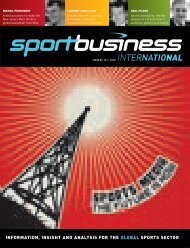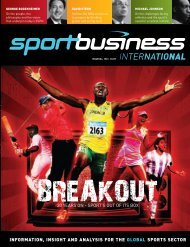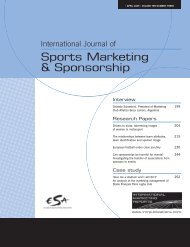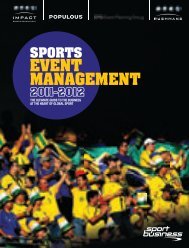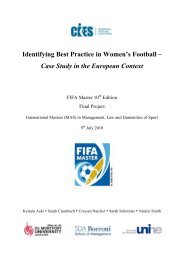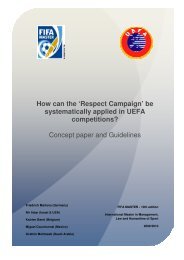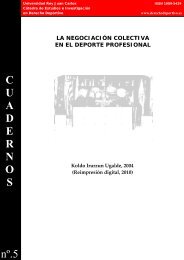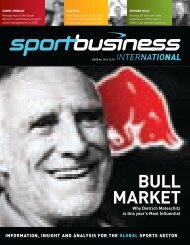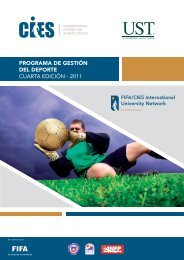01 cover sbi 152.indd - FIFA/CIES International University Network
01 cover sbi 152.indd - FIFA/CIES International University Network
01 cover sbi 152.indd - FIFA/CIES International University Network
You also want an ePaper? Increase the reach of your titles
YUMPU automatically turns print PDFs into web optimized ePapers that Google loves.
MOTORSPORT:<br />
FORMULA ONE<br />
“Hospitality revenues have been<br />
dented by as much as 30 per cent<br />
this year as sponsors and their clients<br />
shied away from public displays of<br />
excess. Nevertheless, F1 has a trick<br />
or two under its bonnet to mitigate<br />
the impact of this revenue loss.”<br />
to the cuts made by most businesses. Indeed,<br />
the sport’s employees are so productive that,<br />
according to research by F1’s industry monitor<br />
Formula Money, they each generate more revenue<br />
than those at any company in the FTSE 100, the<br />
<strong>International</strong> Olympic Committee, <strong>FIFA</strong> and<br />
leading entertainment rights holders such as<br />
Marvel and Nintendo.<br />
One cost which F1 couldn’t keep down was<br />
the amount of prize money paid to the 10 teams.<br />
This accelerated 52.3 per cent to $521 million<br />
under a new agreement which gives the teams 50<br />
per cent of F1’s underlying profits. This doubled<br />
their previous take from the sport and was a key<br />
condition they demanded to prevent them from<br />
leaving the sport.<br />
It served its purpose as in August the teams<br />
signed an extension to the Concorde Agreement,<br />
the contract committing them to F1, until 2<strong>01</strong>2.<br />
The increased team payments sent Delta 3’s<br />
operating profit down from $206 million in 2007<br />
to $86.4 million last year.<br />
The biggest risk to F1 of course comes from<br />
the teams and their not quite annual threat to<br />
quit the sport. In response to the question of<br />
how he can prevent teams leaving F1 Ecclestone<br />
bluntly says “you can’t. The manufacturers won’t<br />
commit. Are they going to write that they commit<br />
to race for seven years, or ten years, five years<br />
They won’t. They don’t know what they’re going<br />
to do next week,” adds Ecclestone.<br />
The teams themselves have put in place a cost<br />
reduction programme, due to be implemented<br />
over the next few years. Ecclestone says that<br />
“it’s not in the Concorde Agreement that’s been<br />
signed...they’re doing it amongst themselves.”<br />
One of the best indications of the outlook on<br />
F1 is its debt price. When private equity firm<br />
CVC bought F1’s commercial rights-holder in<br />
2006 it used $2.8bn of debt from Royal Bank of<br />
Scotland (RBS) and Lehman Brothers. This must<br />
be paid back by 2<strong>01</strong>4. That debt has since been<br />
sold by the banks and the price of the debt gives<br />
a good indication of the sport’s health. The better<br />
the sport is perceived to be doing, the higher the<br />
price of its debt.<br />
After Honda pulled out the debt price<br />
plummeted reaching a low of 48.7p in the Pound<br />
at the end of March according to Markit Group,<br />
which charts credit pricing. This level was lower<br />
than the mean price on Markit’s iTraxx LevX<br />
Index, a gauge of high-risk, high-yield loans<br />
in Europe, which fell to a record low of 68p in<br />
March over debt default concerns. However, the<br />
signing of the Concorde Agreement boosted<br />
F1’s debt price by 9.2p to 84.1p at the end of<br />
August. Since then the debt price has<br />
risen further hitting 90.8p at the<br />
beginning of October - its highest<br />
price in 12 months.<br />
Clearly the scandal<br />
surrounding Flavio Briatore,<br />
which engulfed F1 in September, had<br />
no impact on investor confidence in<br />
the sport. In fact, it seems it may just<br />
have had the opposite effect.<br />
Why Well perhaps the<br />
answer lies in the response,<br />
back in 2005 to an FIA survey<br />
of 93,000 fans. When asked,<br />
amongst other questions,<br />
‘what attributes are perceived<br />
as essential to F1’ some 56<br />
per cent of the surveyed fans<br />
replied ‘intrigue’. No wonder<br />
then that F1 has gone from<br />
strength to strength.<br />
Photos cour tesy of Netball Singapore, Lexus Cup (IMG) & Singapore Spor ts Council<br />
SportBusiness <strong>International</strong> • No.152 • 12.09 55



